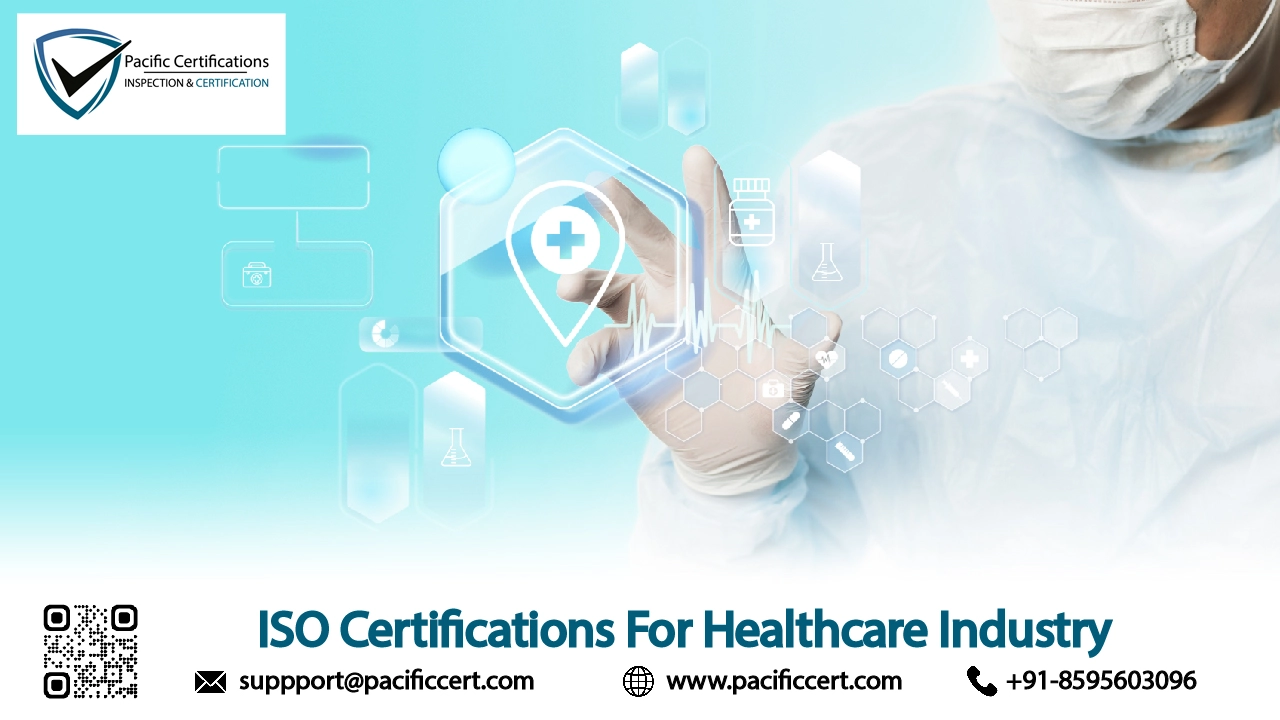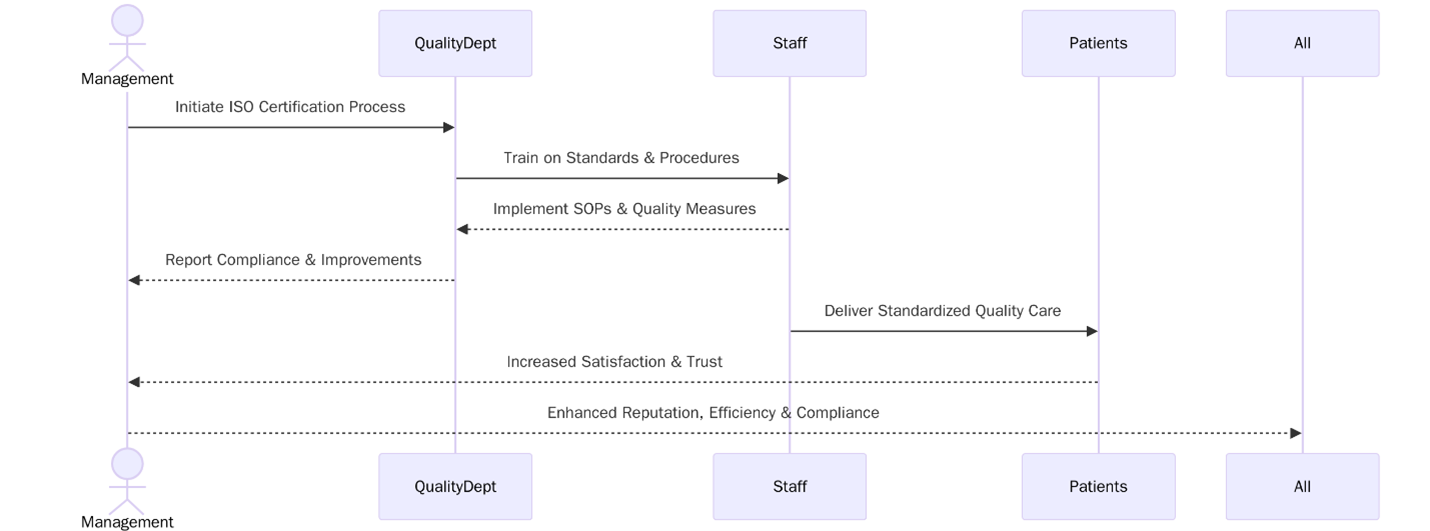Introduction

The healthcare and hospital industry plays a direct role in saving lives and supporting public health. It includes general hospitals, specialty clinics, diagnostic labs, emergency care units, surgical centers and long-term care facilities. Each one helps people recover, manage illness and live healthier lives. These services depend on coordination between medical professionals, support staff, equipment and digital systems. Hospitals have to manage patient safety, medical records, equipment performance and day-to-day care under pressure. At the same time they face rising costs, environmental issues and growing expectations from the public.
ISO certifications give healthcare providers a clear way to manage services. These standards create consistency across departments and make hospital systems easier to monitor and improve. With ISO, hospitals reduce mistakes, support safer care and build more trust with patients.
To begin your ISO journey or schedule an audit contact us at support@pacificcert.com
Why ISO Certifications matter for Healthcare & Hospitals?
Hospitals work under pressure every day. Teams have to deliver safe care fast with no room for delay. The environment must stay clean, secure and calm even during busy hours. Medical data must be protected, treatments must be precise and emergencies need immediate action. If anything goes wrong—whether it’s a wrong dose, a missing record or a failed piece of equipment—the impact on a patient can be serious.
ISO standards help prevent these problems by setting up clear steps for how things are done. Everyone knows their role and how to record what they do. This improves infection control, record keeping and lab testing. When people follow the same system, errors become rare and the work becomes easier to manage.
But hospitals don’t just treat patients. They also handle chemical waste, use lots of energy and manage risks for staff working long hours. Equipment must be ready at all times. Staff need proper training especially in ICU wards, trauma care and surgical areas. ISO standards help hospitals document these activities and check if systems are being followed correctly.
This approach creates a more organized and steady work environment. It improves the quality of care, reduces delays and helps different departments work together better. Managers get clearer data and can act faster while staff feel more confident in how they do their jobs.
Applicable ISO standards for Healthcare & Hospitals
ISO 9001:2015 – Quality Management Systems
ISO 9001 helps hospitals develop clear rules for service delivery. It supports better record keeping, staff accountability, and communication between departments. With this standard, hospitals can reduce service delays and improve how each stage of patient care is tracked.
ISO 13485:2016 – Medical Devices Quality Management
Hospitals that manage or maintain medical equipment use ISO 13485 to monitor device performance and storage. It helps set control points for calibration, cleaning, and replacement of medical tools like ventilators, surgical devices, and infusion pumps.
ISO 15189:2022 – Medical Laboratories Requirements
This standard is used by hospitals with in-house labs. It improves how samples are handled, how test methods are selected, and how results are shared. It is often required for labs that want to deliver consistent and traceable test data.
ISO 14001:2015 – Environmental Management Systems
Hospitals generate waste, consume high energy, and use chemicals that impact the environment. ISO 14001 helps healthcare centers set goals for waste control, water usage, and energy-saving practices in a structured and trackable way.
ISO 45001:2018 – Occupational Health and Safety Management
This standard supports hospitals in protecting workers from harm. It gives clear ways to plan safety drills, monitor working hours, reduce exposure to infection, and prevent physical injury caused by long shifts or equipment use.
What are ISO Certification requirements for Healthcare & Hospitals?
When hospitals implement ISO standards they gain a stable way to manage day-to-day operations with better control. The steps below show what is needed to qualify for certification:

- Perform a detailed gap analysis to compare current practices with ISO standard requirements
- Form a responsible team that will manage the certification process and internal reviews
- Define the scope of work which means listing what services and departments the ISO system will include
- Create required documents such as policies procedures process maps risk assessments and logs
- Train all staff members on how to follow new procedures and record important activities
- Conduct internal audits to check if all procedures are being followed as planned
- Fix identified issues and close gaps found during internal audit checks
- Hold a management review meeting to examine audit results and make decisions on changes
- Apply for the external audit by contacting an accredited certification body
- Complete Stage 1 audit where your documents and readiness are checked in detail
- Complete Stage 2 audit where real work is reviewed to confirm system performance
What are the benefits of ISO Certifications for Healthcare & Hospitals?
By applying ISO standards hospitals gain more control over how they treat patients, how they protect staff and how they manage medical data devices and the environment. These certifications make service steps more predictable and safe:

- Improved patient service quality where every treatment step is recorded and checked to avoid delays or errors in care
- Stronger audit readiness with well-maintained logs and clear evidence that services follow planned procedures every day
- Clear records and traceable operations that support faster decisions better coordination and fewer chances of confusion during care
- Better control of infection risks as cleaning schedules waste handling and staff protection steps are clearly written and followed
- More reliable lab results because test methods calibration and sample tracking are managed through fixed steps with no guesswork
- Safer working conditions for staff with clear health protocols protective equipment tracking and rules for managing shift schedules
- Responsible handling of medical waste where hazardous materials are stored treated and disposed of through traceable actions
- Lower impact on the environment as hospitals manage energy water and waste using practical plans that reduce damage to surroundings
- Fewer errors in equipment use since maintenance logs staff training and safety checks are built into daily service
- Greater transparency in services so patients and families know what care is being given and how it is tracked across each stage
- Higher trust between departments because every unit works from the same system and knows how to share critical updates
- Improved reputation for reliability among patients insurance partners and government bodies through proven and documented quality systems
ISO Certification Trends in Healthcare & Hospitals: 2020 vs. 2025
ISO Standard | 2020 Adoption Rate | 2025 Projected Rate | Key Growth Drivers |
ISO 9001 | 65% | 80% | Higher demand for quality in patient care and service tracking |
ISO 13485 | 40% | 70% | More hospitals owning and maintaining critical devices on-site |
ISO 15189 | 55% | 75% | Rise in diagnostic demand and focus on lab accuracy and safety |
How can Pacific Certifications help?
Pacific Certifications, accredited by ABIS, audits hospitals, clinics and healthcare units for ISO standards based on their services and size. We do not write documents or give advice. Our focus is only on auditing your systems based on clear rules.
- We review submitted documents before audits and highlight gaps that need attention
- We conduct audits with trained professionals who understand healthcare operations
- We offer both remote and on-site audits depending on hospital needs
- We combine multiple ISO standards into a single audit cycle when needed
- We allow flexible audit planning so hospitals can continue to serve patients without interruption
We do not provide consultancy services. Our focus is on impartial value-based audits.
ISO Training and Courses
Training gives your internal team the ability to manage ISO systems over time. It helps reduce outside dependence and builds long-term awareness.
- Internal Auditor Training teaches staff how to check system performance from within the hospital
- Lead Auditor Training is for those who want to lead internal or external audits and gain formal qualifications
- Awareness and Implementation Workshops help staff understand what ISO standards require and how to apply them to their daily work
Pacific Certifications provides accredited training programs. If your organization is looking for ISO 9001 ISO 13485 ISO 15189 training our team is equipped to help you. Contact us at support@pacificcert.com
FAQ: ISO Certifications for Healthcare & Hospitals
Which ISO standard should hospitals with in-house labs follow?
Hospitals with labs should use ISO 15189 to manage accuracy safety and traceability in test results.
Can small clinics or standalone centers get certified?
Yes ISO certifications apply to all sizes. Smaller units follow the same steps but adjust documents to fit their scale.
How long does ISO certification stay valid?
Certifications usually stay valid for three years with annual checks or surveillance audits in between.
Does Pacific Certifications offer implementation support or tools?
No. We only audit systems and provide training. We do not help build or set up your ISO framework.
Is it possible to combine different ISO audits into one?
Yes, hospitals often combine audits like ISO 9001 and ISO 45001 to save time and reduce overlap.
Ready to get ISO certified?
Contact Pacific Certifications to begin your certification journey today!
Suggested Certifications –
Read more: Pacific Blogs




